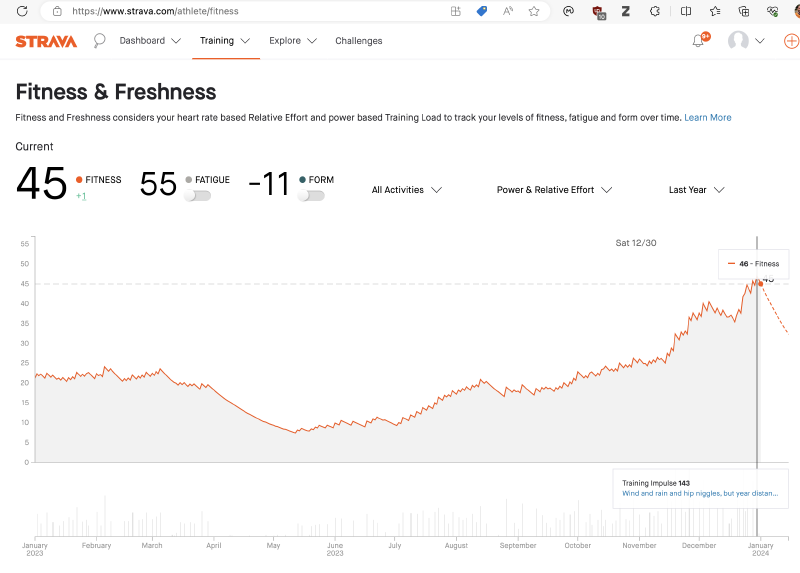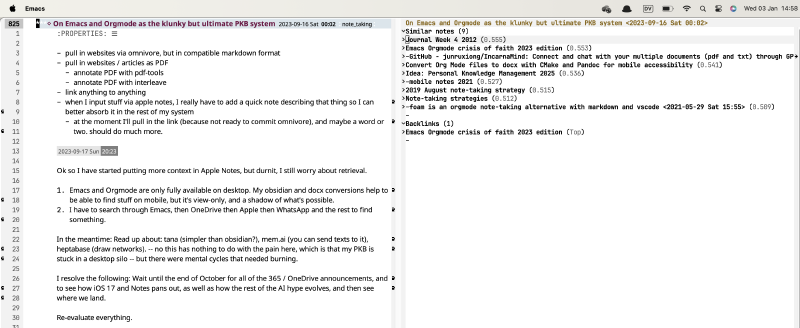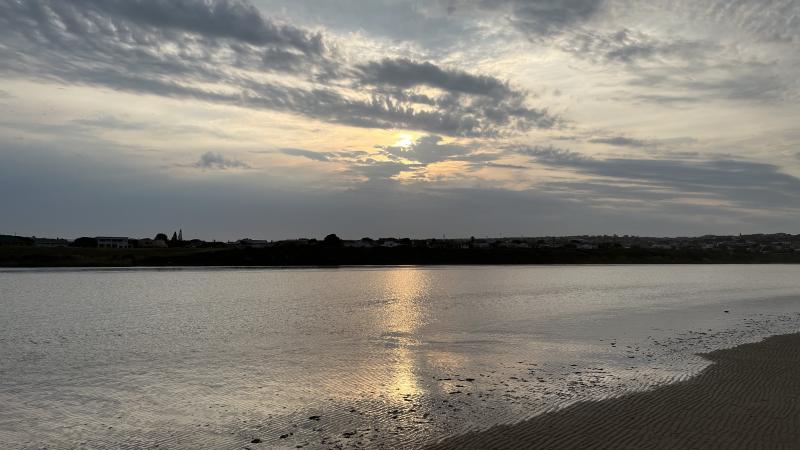Welcome to 2024 everyone, and especially to this traditional yearly year transition post!

Figure 1: View from first morning of the Cape of Good Hope hiking trail with family and friends. The 3-in-1 hill climb in the summer sun at the end of day 2 almost took me out.
Overview, and a warning
While the year transition posts down here are usually an optimistic and upbeat affair, I have to warn you that this year’s edition is a bit different.
Most of the possibly depressing stuff is in the first section, all about aging and cancer and mortality, which you probably could have guessed based on the title, and if not, now on the summary here. Consider strongly skipping the section if you prefer a more optimistic reading of this post.
After the aforementioned harshing of the vibe, I give an extremely spotty review of the physical (running and exercise), the cerebral (writing) and the virtual (systems and tools) aspects of the past year.
I conclude the post with some backyard philosophical ramblings on my continuing efforts at being a good human, and my wishes for you and your loved ones.
Aging is rough
For me, 2023 was the year of really getting in touch with my mortality.
In August of 2023, I started my 50th revolution around the sun.
My birthday might have been enough of a reminder, but the message was made unquestionably clear with my prostate cancer diagnosis in February. No thanks to mother nature, and all thanks to science and modern healthcare, the surgical treatment was swift and as effective as we are able to measure.
Love, by all of my friends and family supporting me throughout all of this, and science, see modern healthcare above, got me through this whole adventure with only a small number of scars to show for it. Besides the physical scars, my previously strong trust in my physical robustness took a really big knock.
Much more recently, as in a day or two ago, the pathology results for two recently excised suspicious skin growths came back from the pathology lab.
Both are basal cell carcinoma (BCC), but while the one was completely excised, the other was not, and was also classified as morpheaform BCC, the rarest and more aggressive form of the three.
To the best of my current knowledge, we just need to remove the rest and I should be mostly derisked, but dangit, I had really hoped not to have to think about any form of cancer again for a little while longer.
So, people, please take the following advice as seriously as you possibly can:
- The sun, especially down here, is amazing but also quite dangerous. Lotion up as often as possible, wear that stupid hat, spend more time in the shade.
- All of you, especially younger readers: Use hearing protection at music events. Last year before Lowlands I acquired Eargast High Fidelity Earplugs, only about 20 years too late! (like skin canccer, tinnitus is another one of those things you have to start actively preventing decades before it possibly starts)
- Over 40? Get your PSA tested.
On a more philosophical and hopefully not too depressing note: It has become viscerally clear to me that once one is past reproductive age, one has irrevocably entered the domain of borrowed time.
If you think about evolution and more specifically selection, you can see that survival traits, by the power of math, could only really be encouraged in the young. After the reproductive phase, with genes already passed on, there could be no effective reward or punishment for respectively beneficial and detrimental traits.
As if that was not enough, the antagonistic pleiotropic (AP) hypothesis posits that there are genes which control more than one trait “where at least one of these traits is beneficial to the organism’s fitness early on in life and at least one is detrimental to the organism’s fitness later on due to a decline in the force of natural selection” (AP - wikipedia, The Evolution of Aging - Nature)
An interesting recent example is this 2021 study of apolipoprotein E (APOE ε4), which is the strongest genetic risk factor for late onset Alzheimer’s disease, but at the same time is also associated with cognitive benefits earlier in life.
From the discussion in the linked paper:
These results taken together provide support for the antagonistic pleiotropic hypothesis as cognitive performance was better at younger ages in APOE ε4 heterozygotes and both heterozygous and homozygous APOE ε4 carriers also had higher risk of dementia at older ages.
So… about “mother” nature.
Nature is beautiful, but absolutely ruthless.
The mental model of “natural” being beneficial for us humans is at best only coincidentally and very partially useful. For the most part, it’s wrong and quite dangerous.
In the end, we can only rely on science, and on each other, to survive and flourish.
Running and exercise
In last year’s transition post, I was hoping for an average of 25km per week in 2023 which would have meant about 1200km for the year.
However, I did not plan on being taken out of the… running for 6 weeks by my prostate before being allowed to start slowing picking it up again.
In spite of that, I was super happy to see a bit later in the year that 1000km was still in reach, and so I went for that.
Something that looks like it could be my gluteus medius attempted to sabotage my efforts during the final weeks, but on December 30 I pushed through with a last run of the year. 1000km in the pocket!

Figure 2: The smooth part of the curve from the start of April until mid-May was for surgery and recovery. I’m happy with the gradual build-up after that and the big push at the end of the year!
Regular running is the mechanical backbone of my life.
Even when the stress is great and it feels like stuff is falling apart, those clockwork runs bring peace and perspective. When it’s going really great, they bring exhilaration and they feel like a celebration of life!
Although I am hopeful that the current injury resolves itself, which it should if it is in fact my gluteus medius, I might start looking into cross-training this year. It would be great to have an alternative exercise modality to tide me over when injuries happen and to keep me out of the sun a part of the time.
My only running-specific desire is to be able to continue running.
For you numbers-people, that’s probably not the most interesting goal.
As a hopefully more satisfying alternative, I would like to offer my super-secret exercise goal for 2024:
- Be able to do 50 consecutive push-ups,
- have a VO₂ Max of at least 50 and
- a resting state heart rate of 50 or under.
Writing
For reasons that I’ve now mentioned often enough, I produced only a small number of longer blog posts in 2023, namely the transition post, three (3) weekly head voices posts (including the cancer one), and the 2023 note-taking strategy post which I’m really happy with.
Besides that, there were a few short technical postlets over on vxlabs.com.
On November 14, faced by this barren landscape of almost no blogging, I thought it was worth trying to break through the concomitant writer’s block by putting out a daily bullet list of life minutiae: Experiences, learnings and observations that might be interesting to Someone on the Internet.
By reducing the expectation to a straight-forward list of daily miscellanea it would in theory be substantially easier and faster to produce said list.
Further, I deliberately did so on my favourite mastodon server, namely emacs.ch, because I trusted that the obscurity of mastodon would mean that not many people would actually see my daily lifelogs, which would further reduce posting friction.
In a surprising turn of events, all of this seemed to work!
As I can’t directly link to a mastodon search yet, you will have to go to my profile or to the #lifelog tag and browse back if you are interested in the first 30 (thirty!) posts, starting on November 14.
On December 18 I decided to move the Daily Head Voices back here because reasons (which you can read about in that post). Since then I have really been enjoying keeping them going during the Christmas break, and I’ve also made some tweaks to the technical setup in order to be able to publish them more efficiently.
Although I would really like to work on more substantial posts in the future, recent experience has shown that it might be a while before I can make the space that that requires. The lifelog posts are an enjoyable way for me to keep the writing pipes open in the meantime!
Systems and tools
A core part of my functioning is the system of software tools and other tricks that I use to work and live better. Other names that people use to describe this thing include second brain, exocortex, or just a really big pile of lists.
Shortly after my pretty detailed Note-taking strategy 2023 blog post, I underwent what I can only describe as some form of Emacs crisis of faith.
During this period, I experienced deep doubt in my current system, and came pretty close to jumping ship.
My crisis was largely due to three things:
- The shiny webkit-based rendering engines in many of the competitors, enabling useful-looking visualizations and interesting new visual interaction approaches.
- The vibrant extension community of the local-first Obsidian note-taking tool where many enthusiasts were tapping into the enormous javascript / typescript library ecosystem, and shiny webkit-rendering mentioned above.
- Emacs and org-mode’s comparatively weak mobile support. (yes, I’ve tried, and purchased were relevant, beorg, plain.org, organice, orgro and probably many more.)
After months of cogitation, I fortunately convinced myself to first test the waters before jumping, where my usual style is just to throw everything out and start over, and extremely quickly ran into the glaring weakness that is Obsidian’s lack of first class support for the humble timestamp…
This is something that we Orgmode users take for granted, but man, the Orgmode timestamp is actually pretty amazing.
This textual analogue of an inverted ice bucket seemed to shock me out of my daze, and suddenly I was again able to make peace with Old Reliable BFG9000, aka Emacs and Org.
As part of my atonement, and also to mitigate some of their perceived deficiencies, I coded up and published the following software upgrades to Emacs, Org-mode and Org-roam:
- braindump4000: Convert any Org-mode database into a hyperlinked website, and also an Obsidian vault, so that you can browse it on your phone using the Obsidian app.
- org-roam-canvas: Expose your whole org-roam database in such a way that you can embed org-roam notes as part of an Obsidian canvas. (see screenshots on the github)
- org-roam-similarity: Use AI-based similarity (i.e. learned document embeddings / vectors) to interactively list similar org-roam notes to the one that you are working on. This is something that I’ve been dreaming about for years, and this is also something that I’ve been using quite regularly and successfully to surface relevant information from the depths of my notes!
- org-roam-to-apple-notes: This was quite painful thanks to Apple’s super bad AppleScript support of Apple Notes, but it has turned out to be quite useful. On macOS, you can export your whole org-roam database, or just the note that you’re currently working on, straight into Apple Notes. Although I implemented base64 embedding of images as this was rumoured to work, images don’t work because Apple.

Figure 3: A screenshot of org-roam-similarity showing similar notes in org-roam-buffer.
As I write this, it really feels like my faith has been fully restored.
AI
2023 was the year when, through the astounding success and utility of large language models like ChatGPT and friends, as well as latent diffusion models like StableDiffusion, Dall-E and Midjourney, and many more examples of generative AI, we could finally start using the term “AI” almost completely unironically!
Thanks to Day Job, I had the opportunity to go quite deep, giving a number of pretty detailed talks on the nuts and bolts of transformer-based language models.
The reason I’m mentioning it here though, is just to make a public note of the fact that I have been exploring and integrating these new tools into all of my workflows as much as makes sense, attempting to push the barriers here and there.
Like the preternaturally productive Simon Willison writes, the current generation of AI coding assistance tools are enabling me to take on personal projects I previously would not have due to the time required, and to get those projects to a usable state far more quickly.
My own programming ability is still the driving force (this is the part in my brain that models and simulates software systems in wetware so that I can implement and debug them), but the AI takes care of so much boiler plate, and also helps quickly exploring multiple high probability solutions to the little problems that one invariably runs into.
Besides Github Copilot which I use in VS Code and also in Emacs via copilot.el to write, sort of ironically, better Emacs Lisp code more quickly, I am trying to integrate at least one AI assistant into my general daily workflow.
My current flavour is perplexity, an LLM-based system that focuses on answering questions, using background web searches coupled with a current generation LLM.
Although perplexity works really well as a question answering tool, I am waiting for something that combines its talents with a more refined version of the already impressive but sometimes a bit wild Open Interpreter (which I have obviously played with), and for that true AI assistant Jarvis-like tool to be always within reach…
Meta’s new Ray Ban AI-powered smart glasses look like a very interesting hardware step in this direction, and might even mean that while I lost that 2009 bet about HUDs with regard to its timing, I was at least thinking in the right direction!
Please excuse the rambling; I am really quite excited about the now near future role of AI assistants in human culture!
Life systems 2024
As January 2022 Charl remarked, our January 2021 self really seemed to have everything figured out and organized, at least in terms of life directions. Furthermore, if we’re being honest with ourselves, January 2023 was also quite fuzzy…
Surprisingly to me however, this year, after spending some thinking time during the vacation, I have compiled a pretty organized-looking and hopefully practical list of personal values, which I will hereby add to the famous WHV approach to life, the universe and everything (WALUE).
You might recall that our guiding principles were two-fold: 1. Love. 2. Science. (in that order)
.. while the The WHV’s Two no Three Rules for Achieving Great Success in Life, or Just Surviving, Whichever Comes First were 1. Be useful, 2. be likable and 3. evolve.
Over the years I added six personal directions on top of all that, and then later, in a seemingly well-motivated but eventually unsuccessful attempt to apply those directions more successfully, I grouped them into two clusters, namely 1. Grow, learn, build, enjoy. (motion) and 2. Be useful. Be likeable. Be kind. (self-checks).
Well, this year I’m replacing those two clusters with the following re-expanded list of my more concrete personal values and priorities. In all cases, it should be possible to use these to check the desirability of any choice or activity.
- Be kind.
- Be grateful.
- Attend fully to the now.
- Enjoy life with family and with my friends.
- Help my children on their journey to becoming useful, likeable and evolving life enjoyers.
- Be there for my family.
- Add value through work.
- Be healthy: Sleep, diet, exercise.
- Build or/or fix something.
- Learn new things.
- Commit to lifelong practice of the good things.
In summary, the shiny new 2024 life systems edition consists of the same old a) two guiding principles and the same old b) two no three rules, but now we’ve added these c) 11 shiny new personal values all for the same low, low price.
There are no real surprises in this list, but hopefully keeping it close will help to bias daily action in the right directions.
P.S. Please don’t forget the PERMA when thinking about your personal well-being.
Wishes for 2024
Dear fellow human,
This is the end of this blog post.
Thank you for being here.
I wish you and your loved ones a year of learning, kindness, gratitude, health and happiness.
